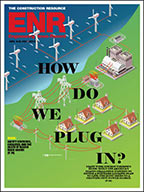With the start of paving, Ames/Granite is adding roughly 40 more workers to the 250 already on the job. Including subcontractors and truckers, 400 workers were involved in the project at mid-summer. Nearly 70 designers worked on the peak of Phase 1 design in 2012. A handful of designers remain on site to handle field modifications.
Phase 1 bridge work involves replacing five spans, including a Burlington Northern Santa Fe Railway bridge and the widening of three others. The entire U.S. 36/Wadsworth Parkway interchange in Westminster, including a bridge, is being moved farther to the west to improve traffic flow.
"They're not long bridges, but there are a lot of aesthetics because of the different municipalities involved, so they're all being customized," Estes says. "Maintaining traffic lanes is a challenge, so we're doing a lot of nighttime work."
Because there is no other direct route between metro Denver and Boulder, CDOT requires U.S. 36 to remain open to traffic during construction. As construction advances, the project shifts traffic lanes to ensure that some remain usable. The lane shifts also force contractors to maintain rough sections of the original roadway, degraded by decades of moisture saturation from rain and snowmelt.
To help the project stay on its fast track, engineers have produced computer roadway models taken directly into the field to get information to the frontline teams earlier.
"They're not the final design but something to allow contractors to move dirt around, excavate for ponds, start grading and so on," says Bryan Mouser, Salt Lake City-based project manager at Michael Baker Corp. "We're doing almost everything electronically, which lends itself to helping the project stay accelerated."
Contractors were ramping up mid-summer to begin construction this winter on the five-mile second phase of the U.S. 36 Express Lanes Project, which expands the highway north to Boulder. Completion is scheduled for early 2016.
Phase 2 Work to Begin This Fall
Phase 2 is CDOT's first public-private partnership/concession project. Plenary Roads Denver, which will operate and maintain the improved U.S. 36 corridor as well as Interstate 25 toll lanes for the next 50 years, was chosen as concessionaire in April. Plenary Roads is a consortium of infrastructure developer Plenary Group Pty. Ltd. and construction-services provider Transfield Services Ltd., both of Australia. It also includes Phase 1 design-build team members Granite Construction, Ames Construction and HDR, and investment banker Goldman Sachs.
"You can get something built sooner with a concession project," says Mark Gosselin, U.S. 36 Phase 1 project director. "There was no identified funding for the next 25 years for U.S. 36, so we couldn't do Phase 2 without a concessionaire."
The design-build portion of the second phase will cost roughly $120 million, CDOT says, but other costs have yet to be determined. Plenary Roads Denver is currently working through contract requirements and lining up financing, which it expects to complete this fall.
Phase 2 extends Phase 1 expansion work to Boulder and includes adding express lanes and shoulders, replacing or widening bridges, installing multiple box culverts for irrigation ditches and improving RTD bus facilities. The same traffic management improvements in Phase 1 will be installed in this segment.



